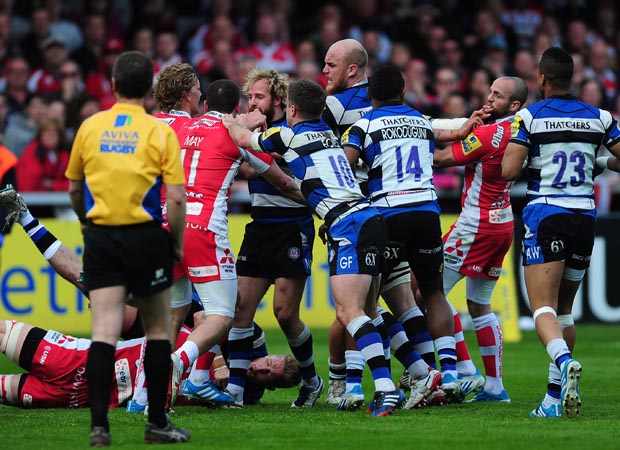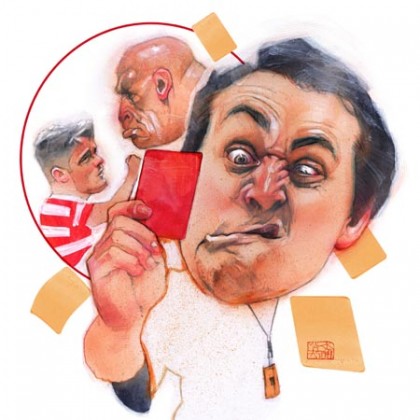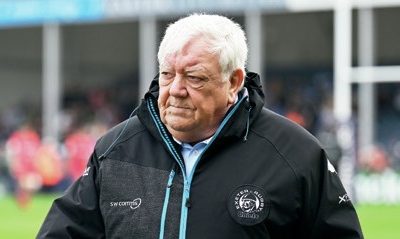
 Empathy. Consistency. Clarity. Accuracy. All those crucial factors were missing for large tracts of the officiating in the Wild West Premiership showdown between Gloucester and Bath last weekend, when two red cards and five yellows were dished out. There was more of the same when Harlequins squeezed past Leicester at The Stoop on Friday night, when three more players were sent to the sin-bin after frustration bubbled over.
Empathy. Consistency. Clarity. Accuracy. All those crucial factors were missing for large tracts of the officiating in the Wild West Premiership showdown between Gloucester and Bath last weekend, when two red cards and five yellows were dished out. There was more of the same when Harlequins squeezed past Leicester at The Stoop on Friday night, when three more players were sent to the sin-bin after frustration bubbled over.
The common denominator in both matches, was the referee, Tim Wigglesworth. Ten cards in two matches suggest strongly that the referee was sadly lacking in the control department, yet in some quarters Mr Wigglesworth has been exonerated of blame for the fiasco at Kingsholm, with the finger pointed instead at the Gloucester and Bath players for their lack of discipline.
I don’t buy that. Certainly, the players shared culpability, especially Gloucester scrum-half Tavis Knoyle’s attempts to turn the closing stages off the match into a saloon-style brawl. At least Wigglesworth got his man on that occasion, sending off Knoyle for his two-fisted attack on Bath No.8 Leroy Houston after conferring with the TMO – but it did not stop the referee being the chief culprit.
Nigel Davies went to the heart of the matter in his post-match comments. Here is the Gloucester director of rugby‘s summary of the refereeing mayhem: “It was a bit of a farce in the second half with a lot of inconsistencies interpretation in numerous areas, and the players got a little frustrated – and that (the fight) was the result of it.”
Watching a re-run of the match this week what struck me most strongly was Wigglesworth’s lack of empathy with the players. We all know that Rugby Union is not always an exact science, and requires that players, when they are not deliberately infringing, or cheating, are given a little leeway. Instead, the referee appeared to be seeking out every little infraction and blowing his whistle with all the eagerness of an infant who has just discovered that the contraption makes a shrill noise.
With no flow to the game, the contest started to become increasingly fractious. And nothing feeds that like inconsistent rulings.
 When Carl Fearns handled in a ruck deliberately and was binned he deserved the game’s first yellow card, with the referee right to use it as a warning to both teams not to compete at the breakdown when off their feet. However, Matt Garvey’s yellow for an innocuous arm around the neck of Gareth Evans was more bad judgement than malicious and merited a penalty at most.
When Carl Fearns handled in a ruck deliberately and was binned he deserved the game’s first yellow card, with the referee right to use it as a warning to both teams not to compete at the breakdown when off their feet. However, Matt Garvey’s yellow for an innocuous arm around the neck of Gareth Evans was more bad judgement than malicious and merited a penalty at most.
Sila Puafisi’s high tackle on Nick Abendanon was bad, and looked worse, but it was more split second reflex and poor technique than a deliberate swinging arm. If Wigglesworth had not already given Garvey a yellow he might have been able to use the sin-bin instead of a red card, but having already raised the tariff it meant the Gloucester prop was off for good. Dave Attwood’s yellow for not releasing while attempting a tackle and steal was unnecessarily harsh, while there was an element of the pedantic about the two yellows given to Mike Tindall and Huia Edmonds, with a penalty probably sufficient in both instances.
Harlequins narrow win over Leicester was infinitely the more entertaining of the two matches, and credit to the London side for keeping their play-off hopes alive with their enterprising high-tempo approach.
However, the match was riven with controversy, and had its own flashpoint when Pablo Matera was binned for dumping Dave Ward, and George Robson followed him for taking revenge with a swinging arm. Ultimately, it was also decided more by Wigglesworth’s calls than Harlequins’ spirit of adventure.
The penalty try straight from a single 5m scrum he awarded five minutes before the interval was by no means clear-cut, and incensed Ed Slater, the Leicester captain. Slater’s objection was based on the existing ‘protocol’ whereby virtually every other Premiership referee will award only a penalty after multiple re-sets.
As Richard Cockerill put it afterwards: “It’s so inconsistent from week to week. We play and we have to have 7, 8, 10, 13 resets before people go under the sticks, but this week it’s a completely different set of rules. It’s just the way it is. The referees aren’t consistent – or they are consistent in that they are not consistent.”
Premiership directors of rugby are not generally the most impartial witnesses when it comes to an objective appraisal of referees, especially losing ones, but this time both Cockerill and Davies had good reason to complain.
After an analysis of the second half I suspect Cockerill will feel even more aggrieved because after the penalty try – where Quins got an initial shunt but then wheeled – there were controversial second half calls by Wigglesworth which proved decisive for the home side.
A scrum collapse saw Nick Evans put Quins ahead 16-13 when Marcos Ayerza was blamed rather than Kyle Sinckler, who clearly went on his knees first before falling flat. Anthony Allen was then wrongly penalised when he tackled Mike Brown, and was on his feet instantly, releasing the Quins full-back, and drove over the ball perfectly legitimately, engaging with Ollie Lindsay-Hague. After Wigglesworth penalised Allen for off-side (?), Quins kicked for the corner and from the subsequent move Brown broke through to score the decisive try. Ben Botica’s late penalty to make it 24-20 was also questionable, with Charlie Matthews slipping offside at a lineout before Geoff Parling was whistled for pulling him back.
The RFU referees’ supremo, Tony Spreadbury, could do worse than remind Wigglesworth and the other professional officials employed by the Union that while referees are essential to the sport, there are 30 to 46 players involved in playing the game who deserve some empathy.
First and foremost, spectators have come to see what they can do – not how often a referee can find reasons to blow his whistle or brandish cards.

1 Comment
You must be logged in to post a comment Login
Leave a Reply
Cancel reply
Leave a Reply
You must be logged in to post a comment.

Latest News
Super Rugby Americas: Round Ten Review

British and Irish Lions
British and Irish Lions: Biggest winners and losers from Andy Farrell’s selection
























Pingback: wheels up